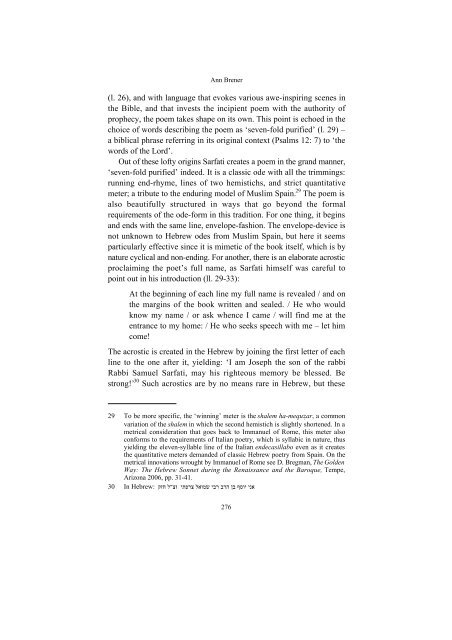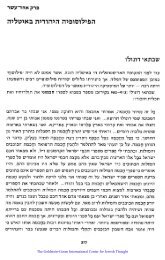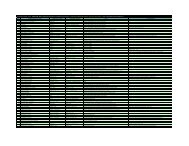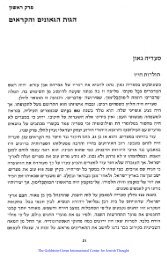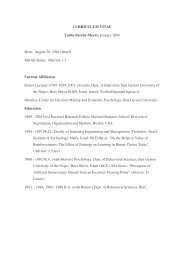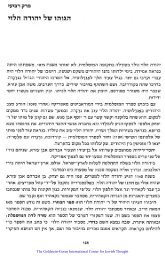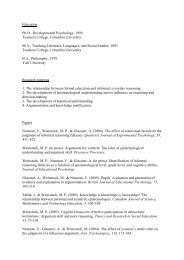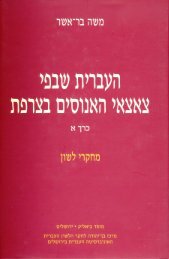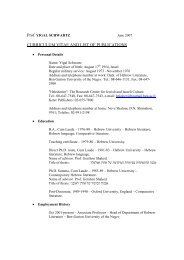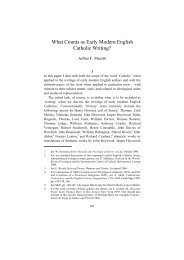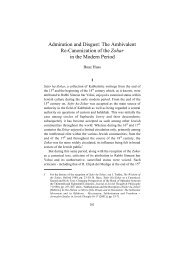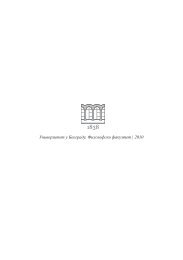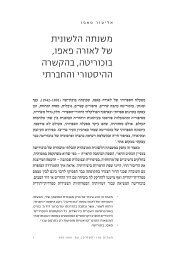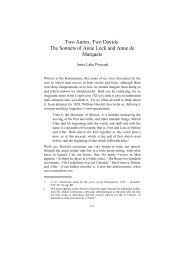A Poem by Joseph Sarfati in Honor of Daniel Bomberg's
A Poem by Joseph Sarfati in Honor of Daniel Bomberg's
A Poem by Joseph Sarfati in Honor of Daniel Bomberg's
Create successful ePaper yourself
Turn your PDF publications into a flip-book with our unique Google optimized e-Paper software.
Ann Brener<br />
(l. 26), and with language that evokes various awe-<strong>in</strong>spir<strong>in</strong>g scenes <strong>in</strong><br />
the Bible, and that <strong>in</strong>vests the <strong>in</strong>cipient poem with the authority <strong>of</strong><br />
prophecy, the poem takes shape on its own. This po<strong>in</strong>t is echoed <strong>in</strong> the<br />
choice <strong>of</strong> words describ<strong>in</strong>g the poem as ‘seven-fold purified’ (l. 29) –<br />
a biblical phrase referr<strong>in</strong>g <strong>in</strong> its orig<strong>in</strong>al context (Psalms 12: 7) to ‘the<br />
words <strong>of</strong> the Lord’.<br />
Out <strong>of</strong> these l<strong>of</strong>ty orig<strong>in</strong>s <strong>Sarfati</strong> creates a poem <strong>in</strong> the grand manner,<br />
‘seven-fold purified’ <strong>in</strong>deed. It is a classic ode with all the trimm<strong>in</strong>gs:<br />
runn<strong>in</strong>g end-rhyme, l<strong>in</strong>es <strong>of</strong> two hemistichs, and strict quantitative<br />
meter; a tribute to the endur<strong>in</strong>g model <strong>of</strong> Muslim Spa<strong>in</strong>. 29 The poem is<br />
also beautifully structured <strong>in</strong> ways that go beyond the formal<br />
requirements <strong>of</strong> the ode-form <strong>in</strong> this tradition. For one th<strong>in</strong>g, it beg<strong>in</strong>s<br />
and ends with the same l<strong>in</strong>e, envelope-fashion. The envelope-device is<br />
not unknown to Hebrew odes from Muslim Spa<strong>in</strong>, but here it seems<br />
particularly effective s<strong>in</strong>ce it is mimetic <strong>of</strong> the book itself, which is <strong>by</strong><br />
nature cyclical and non-end<strong>in</strong>g. For another, there is an elaborate acrostic<br />
proclaim<strong>in</strong>g the poet’s full name, as <strong>Sarfati</strong> himself was careful to<br />
po<strong>in</strong>t out <strong>in</strong> his <strong>in</strong>troduction (ll. 29-33):<br />
At the beg<strong>in</strong>n<strong>in</strong>g <strong>of</strong> each l<strong>in</strong>e my full name is revealed / and on<br />
the marg<strong>in</strong>s <strong>of</strong> the book written and sealed. / He who would<br />
know my name / or ask whence I came / will f<strong>in</strong>d me at the<br />
entrance to my home: / He who seeks speech with me – let him<br />
come!<br />
The acrostic is created <strong>in</strong> the Hebrew <strong>by</strong> jo<strong>in</strong><strong>in</strong>g the first letter <strong>of</strong> each<br />
l<strong>in</strong>e to the one after it, yield<strong>in</strong>g: ‘I am <strong>Joseph</strong> the son <strong>of</strong> the rabbi<br />
Rabbi Samuel <strong>Sarfati</strong>, may his righteous memory be blessed. Be<br />
strong!’ 30 Such acrostics are <strong>by</strong> no means rare <strong>in</strong> Hebrew, but these<br />
29 To be more specific, the ‘w<strong>in</strong>n<strong>in</strong>g’ meter is the shalem ha-mequΩar, a common<br />
variation <strong>of</strong> the shalem <strong>in</strong> which the second hemistich is slightly shortened. In a<br />
metrical consideration that goes back to Immanuel <strong>of</strong> Rome, this meter also<br />
conforms to the requirements <strong>of</strong> Italian poetry, which is syllabic <strong>in</strong> nature, thus<br />
yield<strong>in</strong>g the eleven-syllable l<strong>in</strong>e <strong>of</strong> the Italian endecasillabo even as it creates<br />
the quantitative meters demanded <strong>of</strong> classic Hebrew poetry from Spa<strong>in</strong>. On the<br />
metrical <strong>in</strong>novations wrought <strong>by</strong> Immanuel <strong>of</strong> Rome see D. Bregman, The Golden<br />
Way: The Hebrew Sonnet dur<strong>in</strong>g the Renaissance and the Baroque, Tempe,<br />
Arizona 2006, pp. 31-41.<br />
אני יוסף בן הרב רבי שמואל צרפתי זצ"ל חזק Hebrew: 30 In<br />
276


